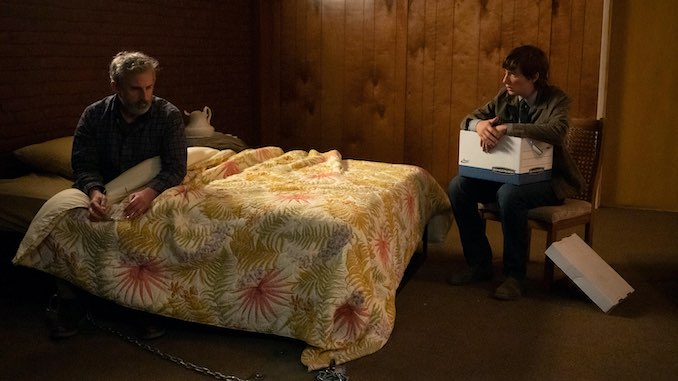FX’s The Patient Is Depressing, Overly Introspective, and Worst of All… Not About Serial Killers
Photo Courtesy of FX
The 10-episode FX series The Patient is the story of a serial killer, Sam (Domhnall Gleeson), who kidnaps his therapist Dr. Straus (Steve Carell).
When you read that premise you, like me, might think “Hey, this show will probably be aware of the humor in that idea. Surely The Patient understands it’s kind of funny, and explores the absurdity of such an out-there premise.” Well, I regret to inform you that The Patient might be one of the most deathly serious television shows ever made. It has a level of somberness and sustained depression that will put critiques of the first season of The Leftovers to shame.
The Patient is about death: thinking about death, thinking about who you’d like to be when you die, and coping with the eventual death you will face. But it’s also about fractured father-son relationships, whether it’s possible to change, and coming to an understanding with your Jewish faith. The Patient is, rather surprisingly, not about serial killers at all.
I first understood The Patient, created by Joe Weisberg, as The Americans meets Mindhunter. That’s the closest comparison that can be made, with The Patient focusing on the realistic clinical psychology of serial killers rather than the academic approach Mindhunter takes. Weisberg, co-creator of The Americans, already wrote a show that masqueraded as one thing (a series about Cold War-era spies) but really found its substance in another (dissecting marriage and familial roles).
But The Patient feels more like a show whose story was never broken. There’s a division between the premise and the product. Sometimes The Patient features phenomenal conversations between Carell and Gleeson, who are both completely immersed in this dreary world. Sometimes The Patient is reaching for deeper themes on faith and change. But these aspects never come together into one cohesive show.
For all my criticism, I don’t think The Patient is a bad show. It is technically very well done, with a perfectly unsettling score and excellent sound design. By mostly taking place in one room, The Patient is able to achieve an eerie comfortableness in such a mundane environment. Gleeson is the highlight of the series; his portrayal of serial killer Sam manages to rise above many exaggerated takes on a twisted mind to make a man who is genuinely terrifying.
The only small bits of levity and humor in The Patient come from Sam. While a serial killer, Sam is also a foodie and enjoys describing all the wonderful dishes he gets from restaurants. He’s also a major fan of Kenny Chesney and interacts on fan forums. Sam also has a strange fixation on Judaism, acknowledging he specifically looked for Jewish therapists, and seems to long for the solid religious grounding and community the religion would give him (although this idea, like many others, is not explored very much as the series progresses). It’s these little oddities that make Sam a bit more than just a generic serial killer, something the show desperately needs.
-

-

-

-

-

-

-

-

-

-

-

-

-

-

-

-

-

-

-

-

-

-

-

-

-

-

-

-

-

-

-

-

-

-

-

-

-

-

-

-








































